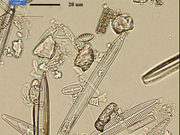Laura Triplett
| Geology & Environmental Studies
| Home |
Geomorph lab at Rush River
Hydro fieldtrip to Mystery Cave
Principles local fieldtrip

Microscope image of fossil algae in
lake mud
Athabasca glacier, New Zealand
Snack break during class canoe trip
down Blue Earth River
Courses I Teach
Geomorphology (GEO 246)
Prerequisite: One course from GEO 111, GEO 120, ENV 120 or GEG 105
We live on the thin surface of the earth, the interface between the hard rock of our planet and the comparatively wild environment of the atmosphere. Geomorphology is the study of how the earth and the atmosphere interact: that is, how ice, water, tectonics, wind, etc. shape the landforms we see around us. We can learn about the geologic past by studying those landforms, and we can learn about the geologic future by understanding how those landforms will continue to change and thus affect our society. In this course, we think a lot about the two most important forces that have shaped Minnesota’s landscape over the past million years: glaciers and rivers. We also explore how wind, ocean tides and currents, tectonics, gravity (i.e. landslides) and human activities shape the planet. The best way for you to experience geomorphology is to get out and see it for yourself, so we have several labs “in the field” and a weekend-long fieldtrip in October. You will also conduct a small, original research project during the semester, with significant guidance and support from your classmates and me.
Hydrogeology (GEO 350)
Prerequisite: GEO 111 or GEO 120/ENV 120
Hydrogeology is the study of the part of the global hydrologic cycle that contacts geologic materials. More than two-thirds of Minnesotans get their drinking water directly from groundwater, and almost all other people's water supplies are also linked to groundwater to some degree. However, few citizens, legislators or even environmental professionals have a good understanding of groundwater processes. As an industry, hydrogeology employs more geologists than any other sub-discipline, and many consulting firms expect that any geologist they hire will have taken a hydrogeology course. For all of these reasons, a solid foundation in hydrogeologic principles will serve you well in the future.
Principles of Geology (GEO 111)
Prerequisite: None
Geology concerns the earth and the processes that operate on and within it. Geological processes and their effects are all around us, shaping the land we live on and the kinds of lives we can live on that land. Because of this, many geological phenomena are observable and tangible, making geology accessible to students from every background and level of interest. We study rocks, minerals, volcanoes, earthquakes, rivers, glaciers, groundwater, and more... anything that has to do with the earth is fair game.
Paleolimnology: Who wrote the book of mud? (GEO 110, offered during January term)
Prerequisite: None
No one likes mud between their toes, but when you get mud under a microscope you'll be amazed at the stories it can tell! We will collect mud cores from a local lake that is the subject of a land-use controversy. Using that mud as our history book, we will reconstruct the lake's environmental past using things like fossil algae and heavy metal pollutants. We will read about other lakes, then do our own chemical and microscopic analyses of our lake mud here and at the University of Minnesota. This course should appeal to students considering careers in environmental science.
Global Climate Change (GEO 237)
Prerequisite: One course from GEO 111, GEO 120, ENV 120, GEG 105, GEG-108
Global climate change is one of the foremost political, economic and scientific issues of our time. In this course we will learn how earth’s climate system has changed through geologic time by reading books and discussing articles, watching films and perhaps most importantly, by exploring available climate data ourselves. There is an unbelievable amount of data now available online, and we will spend considerable time learning to find, organize and critically evaluate it. In addition, we will collect our own climate record, a sediment core from a nearby lake, and we will spend some time in the lab attempting to "read" the environmental history hidden therein.
River (FTS 100)
(First-semester students only)
Rivers have always been the mighty arteries of human civilization: from ancient Egyptians farming along the Nile, to Huck Finn escaping down the Mississippi, to the controversial construction of the Three Gorges Dam on the Yangtze River in China, rivers are central to human economy and culture. Rivers are also the crucial link between the land and sea because they move water, eroded soil and rock, and chemicals – both natural and unnatural – from the continents to the oceans. We will study rivers as a physical systems: How do rivers shape the landscape, including here in our own front yard? How do they control the chemistry and ecosystems in the oceans? And, how have humans changed them?